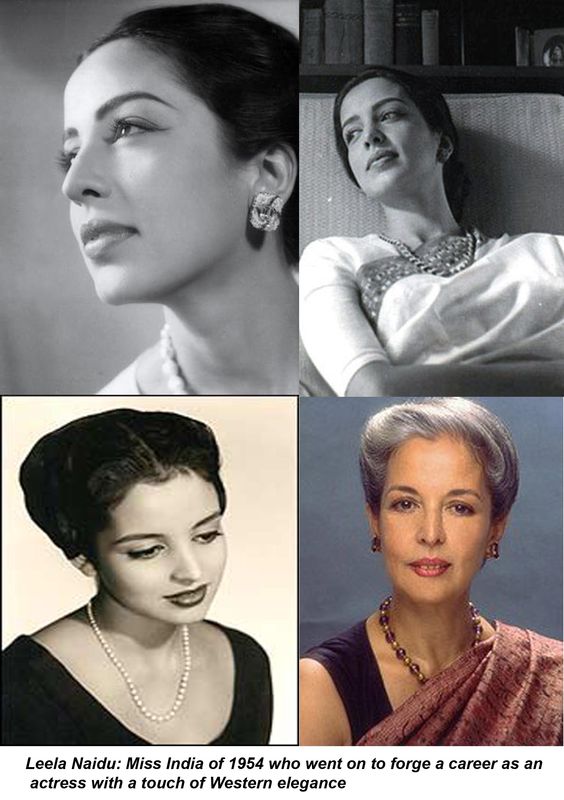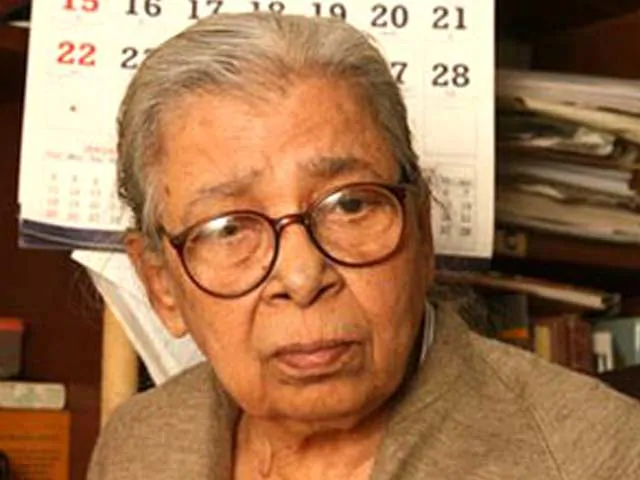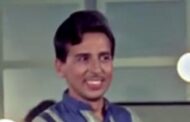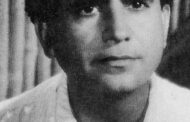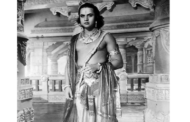Leela Naidu was an actress who starred in a small number of Hindi and English films, including Yeh Raaste Hain Pyar Ke (1963), based on the real-life Nanavati case, and The Householder, Merchant Ivory Productions’ first film. She was Femina Miss India in 1954, and was featured in the Vogue along with Maharani Gayatri Devi in the list of ‘World’s Ten Most Beautiful Women’, a list she was continuously listed from the 1950s to the 1960s in prominent fashion magazines worldwide. She is remembered for her stunning classical beauty and subtle acting style.
Leela Naidu was born in 1940 ? Bombay (now Mumbai),to Dr. Pattipati Ramaiah Naidu, a well known nuclear physicist from Madanapalle, Chittoor Dist., Andhra Pradesh, who worked under the supervision of Nobel Laureate Marie Curie for his doctoral thesis in Paris and ran one of her labs. He set up medical radiation equipment devised at the Curie Institute in the United States and India. He had to leave laboratory research after getting cancer from working with radioactive materials. He was Scientific Advisor to UNESCO for Southeast Asia, and later, an advisor to the Tata group. Her mother, journalist and Indologist Dr. Marthe Mange Naidu, was of Swiss-French origin, and earned her Ph.D. from the Sorbonne.She was the only surviving child out of eight pregnancies as Marthe had seven miscarriages. In her 2009 semi-biography of anecdotes co-authored with Jerry Pinto, it was related that her grandfather on her mother’s side owned a factory where he fired a young Benito Mussolini for beating up a coworker, and her grandmother had a strange interlude with a Russian prince who was their next door neighbour who later turned out to be one of Rasputin’s assassins.
On her father’s side, her aunt was Indian independence fighter Sarojini Naidu and she was thus well acquainted growing up with and knowing prominent Indians like Gandhi, Nehru, and Indira Gandhi to name a few.Leela Naidu was crowned Femina Miss India in 1954, and the same year was featured in Vogue magazine’s list of the world’s ten most beautiful women.
Naidu made her film debut alongside Balraj Sahni in Anuradha (1960), directed by Hrishikesh Mukherjee. Mukherjee cast Naidu in the role after he happened to see one of her pictures taken by Kamaladevi Chattopadhyay. Though it was not successful at the box office, the film went on to win the National Film Award for Best Feature Film, and garnered Naidu critical acclaim. The movie’s music, including the songs Haye re woh din kewn na aaye, Jaane kaise sapnon mein kho gayin ankhiyan and Kaise din beete kaisi beeti raatein, were composed by sitar maestro Ravi Shankar. Naidu’s next film was Nitin Bose’s Ummeed (1962), alongside Ashok Kumar and Joy Mukherjee.
She played an offbeat role as an adulterous wife in Yeh Raaste Hain Pyar Ke (1963), directed by R. K. Nayyar. The movie, which co-starred Sunil Dutt and Rehman, was based on the real life case K. M. Nanavati vs. State of Maharashtra. Despite its topical nature and controversial theme, the movie flopped; however, some of its songs, notably “Ye Khaamoshiyaan, Ye Tanahaaiyaan,” became quite popular.
In 1963, Naidu played the lead role of a rebellious young bride in the first Merchant Ivory film, The Householder, directed by James Ivory. According to Leela in her 2009 semi-biography, Ismail Merchant and James Ivory had approached her about making their first ever feature movie with a story about an archaeologist but this fell through as the backers did not like the film script. She then suggested to Merchant-Ivory, making a movie about a book called The Householder by Ruth Prawer Jhabvala which led to their introduction to Ruth and a fruitful lifelong partnership. Satyajit Ray loaned his crew, got many of the actors he used in his movies to act in this movie, selected the music and musicians, and re-cut and reedited the final version, thus guiding and teaching Merchant-Ivory in movie making technique which they successfully used in their award winning movies and documentaries in the future.
After watching her performance in the The Householder, Satyajit Ray who had actually assisted and guided Merchant-Ivory in their first film venture planned an English film, The Journey, with Marlon Brando, Shashi Kapoor and Naidu, but sadly the film was never made.She was considered for the role of Rosie in Vijay Anand’s Guide (1965), but the role required a trained dancer, and so Naidu lost out to Waheeda Rehman. Her last film in Hindi mainstream cinema was Baghi (1964) a costume extravaganza co-starring Pradeep Kumar, Vijaya Choudhury, and Mumtaz.
Later, Naidu made a guest appearance in the Merchant-Ivory film, The Guru (1969).She returned to cinema in 1985 to play a Goan matriarch in Shyam Benegal’s period film, Trikaal.Her appearance in Electric Moon (1992), directed by Pradip Krishen, turned out to be her last cinematic role.
She turned down Raj Kapoor four times when he approached her for casting her in his films.
In September 2009, Lila, a documentary on Leela Naidu’s life, by Bidisha Roy Das and Priyanjana Dutta was released.
In 1956, at the age of 17, she married Tilak Raj Oberoi, son of Mohan Singh Oberoi, the founder of the luxury Oberoi Hotels chain.Tilak Raj, known as “Tikki”, was 33 years old at the time.Naidu and Oberoi had twin daughters, Maya and Priya. The brief marriage ended in divorce, and Oberoi won custody of the girls. Subsequently, Naidu met philosopher Jiddu Krishnamurti while in London, and was deeply attracted to his teachings.In 1969, she was married for the second time, to Mumbai poet Dom Moraes. They lived in Hong Kong, New York, New Delhi, and Mumbai for about 25 years. After the relationship ended, Naidu led a somewhat reclusive life in Colaba, Mumbai.
Her grandsons are Adam, Maya’s son, and Erwan, Priya’s son. Priya died of a heart attack on February 8, 2008. Naidu also has a god-daughter of four decades, Oopali Operajita, whom she met at Rishi Valley School, who is a Distinguished Faculty Fellow at Carnegie Mellon University, a celebrated classical Odissi dancer, and a Senior Adviser to several of India’s prominent leaders in the Lok Sabha.Leela Naidu died in Mumbai on 28 July 2009, due to lung failure after a prolonged bout of influenza, at the age of 69.
